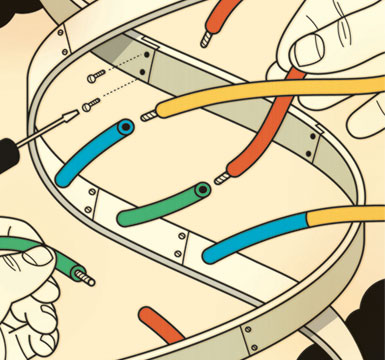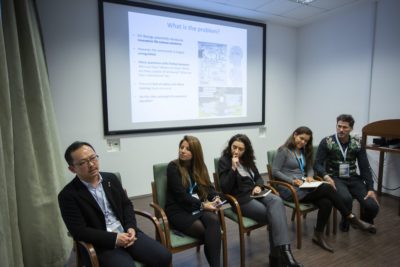
This GYA working group was active until June 2021. It is now dormant, and can be picked up again in the future by any GYA member(s) interested in the topic. For the time being, the GYA working group on Biodiversity will also cover DIY biology topics.
Synthetic Biology relates to human-made biological mechanisms, artificial biochemical, and cellular pathways created using natural and synthetic biomolecules and their component materials. (ii) Nucleic acids used for information storage and transfer; where digital information is encoded employing nucleotide sequences of synthetic RNA and DNA molecules. (iii) Semi-artificial organisms, where part of, or even an entire, genome is integrated into a living cell to invoke desired new functions and capabilities. (iv) Biosensors: biosynthetic devices capable of sensing and reporting some ambient phenomenon such as brain activity or presence of toxins in the environment. (v) Synthetic custom-designed proteins; novel protein structures with new or improved functions. (vi) Finally, synthetic biology can be used for materials production. Here, living cells function as microscopic molecular foundries to produce materials with desired, genetically encoded, properties. These technologies have both benefits and dangers associated with them.
Our GYA Working Group aims to promote the DIY Biology culture and awareness, with a special focus on young people, and links to policy, bio-security, international agenda, and artistic/futuristic influences in popular science. Advisors need to go beyond the usual sources of ‘accredited’ experts located in academia and industry to include a new generation of experts – some of whom may have little formal academic training – developing new biological products in kitchens, garages, high schools, and community centres around the world. The GYA is well placed to lead such an initiative, as its members, alumni, together with its role as the main point-of-contact for the global community of National Young Academies, comprise the most extensive network of emerging research leaders around the world.
The project will develop a communication platform between seasoned academic researchers and non-academic DIY biologists. Ideally, other stakeholders (biotech and pharma companies) could be folded into future processes to further unify and address opportunities and challenges and of this novel field.
The DIY Biology group will aim to enable dialogue and collaboration between academics and non-academics, as well as policymakers. The project outcome will provide further capacity building among stakeholder groups, enabling development of skill sets that will contribute to regulation, clarification, and unification of the field. The group will promote the basics of the ‘post-genomic literacy’ in society to lay the foundation for long-term relationships between academia and DIY maker spaces. DIY Biology has a potential of addressing some of the SDGs and is a great example of heavily promoted Open Science. Lessons learned may permeate and foster other fields of Open Science.
The group is currently working on a scoping report on a “DIY Biology Research Proposal”, which will analyse the global DIY Biology landscape. This activity is funded by the Volkswagen Foundation; initially for a 12-months period (June 2018-June 2019). Finalising the report has been postponed due to the current COVID-19 pandemic.
The group is aiming to produce a report on the prospects, risks, and opportunities around DIY Synthetic Biology. Additionally, the group is exploring the development of a potential online course on bioethics and biosafety for non-scientists, DIY biologists, and biohackers.
They have run two online surveys, which were widely shared with the GYA membership and relevant stakeholders outside the GYA:
– one on the global DIY Biology landscape: the aim is to explore the global landscape of DIY biology and understand the challenges and opportunities in the field. The information gained will be used to inform policies that can help support the maximising of benefits and minimising of the associated risks related to the DIY biology field.
– and another on the perception of bio-risks: the aim is to understand the perception of bio-risks associated with Do-it-yourself (DIY) Biology. The information gained will be used to inform policies that can help support the maximising of benefits and minimising of the associated risks related to the DIY biology field.
GYA members Alexander Kagansky (Russia), Velia Siciliano (Italy), Clarissa Rios (Peru), Sandra Lopez (Panama) and GYA alumnus Shoji Komai (Japan) organised a session on “Ethical challenges and governance responsibilities of do-it-yourself biology” at the 2019 World Science Forum in Budapest, Hungary, in November 2019.

Working group co-lead Bartlomiej Kolodziejczyk (Australia) and the group’s external research assistant Khalisah Zulkefli took part in a preparatory workshop meeting on STI for the UN SDGs in Bangkok, Thailand, in February 2019. They presented on synthetic biology and gene drives. See here for more information.
Working group co-lead Bartlomiej Kolodziejczyk (Australia) recently acted as a co-lead author for the section on “Synthetic Biology: Re-engineering the environment” in the United Nations Environment Programme (UNEP) Frontiers publication on “Emerging Issues of Environmental Concern”.
Group members have published a paper on “Sharing digitized DNA sequences must balance scientific progress with fair use” in October 2018.
GYA and working group members Bart Kolodziejczyk, Alexander Kagansky, John Malone, Clarissa Rios Rojas, Sandra Lopez Verges organized a panel session on the “Do-it-yourself biology movement in Latin America as a driving force of innovation and entrepreneurship” at CILAC 2018 (Open Science Forum for Latin America and the Caribbean). More information on this panel here.
Working group member John Malone (USA) represented the group at the 2018 UN Multi-stakeholder Forum on Science, Technology and Innovation in New York City, USA, in June 2018, where he served as a panellist at the side event on “Implications of emerging biotechnologies in the context of biological diversity: multi-stakeholder perspectives on the risks and benefits”. The event was organized by the Yale Institute for Biospheric Studies – Editing Nature, Innovative Genomics Institute at UC Berkeley and the UN Major Group for Children and Youth to discuss the role of gene editing and gene drive technologies in making progress towards the UN SDGs and the 2030 Agenda.
Working group co-lead Bartlomiej Kolodziejczyk (Australia) presented a science policy brief on Do-it-yourself biology: an open innovation movement or a threat? at the UN Department of Economic and Social Affairs expert group meeting on accelerated technological change and policy implications for the UN SDGs in Mexico in April 2018.
Two members of the group contributed to a G20 policy brief on “Consolidated G20 synthetic biology policies and their role in the 2030 Agenda for Sustainable Development”.
The group organised a policy Hackathon which took place before the International Workshop on “Assessing the Security Implications of Genome Editing Technology” organised by the the InterAcademy Partnership (IAP), the European Academies’ Science Advisory Council (EASAC), the US National Academies of Sciences, Engineering, and Medicine (NASEM), and the German National Academy of Sciences Leopoldina in October 2017. The resulting policy briefs and policy recommendations will be published soon.